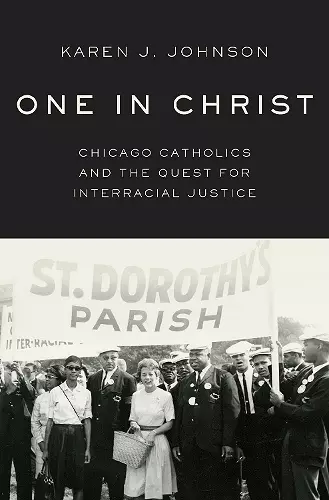One in Christ
Chicago Catholics and the Quest for Interracial Justice
Format:Hardback
Publisher:Oxford University Press Inc
Published:27th Sep '18
Currently unavailable, and unfortunately no date known when it will be back

Today, the images of Catholic priests and nuns marching in 1960s civil rights protests are iconic. Their cassocks and habits clothed the movement in sacred garments. But by the time of those protests Catholic Civil Rights activism already had a long history, one in which the religious leadership of the Church played, at best, a supporting role. Instead, it was laypeople, first African Americans and then, as they found white partners, black and white Catholics working together, who shaped the movement regular people who, in self-consciously Catholic ways, devoted their time, energy, and prayers to what they called "interracial justice," a vision of economic, social, religious, and civil equality. Karen J. Johnson tells the story of Catholic interracial activism from the bottom up through the lives of a group of women and men in Chicago who struggled with one another, their Church, and their city to try to live their Catholic faith in a new, and what they thought was more complete and true, way. Black activists found a handful of white laypeople, some of whom later became priests, who believed in their vision of a universal church in the segregated city. Together, they began to fight for interracial justice, all while knitted together in sometimes-contentious friendship as members of the Mystical Body of Christ. In the end, not only had Catholic activists lived out their faith as active participants in the long civil rights movement and learned how to cooperate, and indeed love, across racial lines, but they had changed the practice of Catholicism. They broke down the hierarchy that placed priests above the laity and crossed the parish boundaries that defined urban Catholicism. Chicago was a vital laboratory in what became a national story. One in Christ traces the development of Catholic interracial activism, revealing the ways religion and race combined both to enforce racial hierarchies and to tear them down, and demonstrating that we cannot understand race and civil rights in the North without accounting for religion.
Johnson spotlights important but overlooked activists, for example, African American Catholic physician Arthur G. Falls, and she provides valuable insights into their work by taking their faith claims seriously and by tapping wide-ranging sources (from unpublished memoirs to the archives, in northern Ontario, of the trailblazing US Catholic racial justice group Friendship House.) ... Summing up: Recommended * CHOICE *
Johnson's compelling book succeeds in reconstructing a multilayered story of the energetic efforts of black and white Catholics to become one in Christ. * Phillip Luke Sinitiere, Fides et Historia *
This book is an important contribution to several overlapping fields: Catholic history, urban history, the civil rights movement, and the history of Chicago. In light of Johnson's findings, many new questions can be raised about Catholics, race, and urban life in the 20th century. The civil rights movement is far richer and theologically deeper than is usually understood ... One in Christ proves itself an important intervention that will have lasting effects on modern American history. * Peter Cajka, American Catholic Studies Newsletter *
One in Christ is a valuable history. Johnson offers important insights about the place that Catholicism and Catholics had in shaping and redressing American culture and life, particularly with regards to race. The strength of her study is the manner in which she reveals and interprets the role that Catholics played in helping to craft communities of ecumenical and interreligious white allies for the Civil Rights Movement of the 1960s. * Cecilia A. Moore, Reading Religion *
Karen J. Johnson's One in Christ has it all: white versus black and white with black; Catholic versus Protestant and Catholic with Protestant; Catholic versus Catholic and Catholic with Catholic. Widely researched, analyzed with precision, and focused on the magical messiness of everyday life, this book is necessary reading for anyone interested in race, religion, and justice in the past and present. * Edward J. Blum, co-author of The Color of Christ: The Son of God and the Saga of Race in America *
Karen J. Johnson has made a remarkable contribution to scholarship on interracial civil rights activism in the Northern United States. One in Christ is balanced in its attention to clergy and laity, and innovative in its intersectional placement of religion, race, gender, sexuality, class, and place at the heart of its analysis. Rigorous and passionate in its research and presentation, One in Christ will be appreciated as a cornerstone achievement in the history of the Catholic interracial justice movement. * Omar M. McRoberts, author of Streets of Glory: Church and Community in a Black Urban Neighborhood *
A tour de force. One in Christ takes us into the streets and parishes of Catholic Chicago, richly exploring the much understudied work of the laityparticularly womenin shaping, defining, and acting for interracial unity and justice. In a delightfully engaging text, Johnson draws us into the messiness of human interaction for change and resistance during the long civil rights movement of the 1930s to the 1960s. Her findings and interpretations have deep meaning for our current times. A must read for anyone wanting to understand civil rights and racial change. * Michael O. Emerson, author of Divided by Faith, United by Faith, and Transcending Racial Barriers *
With warmheartedness and clarity, Karen J. Johnson explores conundrums about race and morality in the United States in One in Christ: Chicago Catholics and the Quest for Interracial Justice. * Benjamin Ivry, America Magazine *
ISBN: 9780190618971
Dimensions: 160mm x 236mm x 18mm
Weight: 612g
320 pages